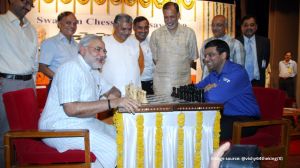PM sidesteps politics in poll-bound Mauritius
It is not mere coincidence that both former Prime Minister A.B. Vajpayee and his successor Manmohan Singh chose to head for Mauritius on the...

It is not mere coincidence that both former Prime Minister A.B. Vajpayee and his successor Manmohan Singh chose to head for Mauritius on their bilateral visit six months before general elections in the island nation.
Vajpayee had made a tactical visit in the second week of March in 2000. And five years later, Manmohan Singh is on a similar strategically significant four-day trip, a few months before the country chooses a new prime minister. The difference is that Singh is playing very little overt politics compared to Vajpayee.
Last time, both Vajpayee’s PMO and the Ministry of External Affairs had pitched for the Mauritius Labour Party, headed by Navinchandra Ramgoolam, son of the island country’s Father of the Nation, Sir Seewoosagar Ramgoolam. Vajpayee’s visit included trips to Ramgoolam’s pockets of political influence, a clear indication that New Delhi was interested in the outcome of the polls.
Mauritius has 51 per cent Hindu vote and Ramgoolam had hoped that Vajpayee’s appeal would help him garner a majority. The move backfired and Ramgoolam lost. India was left to deal with a new government that bore serious grievances towards the political establishment in Delhi. The two important partners of the coalition in power, Aneerood Jugnauth of the Mouvement Socialiste Militant (MSM) and Paul Berenger of the Mouvement ‘Militant Mauricien (MMM) needed reassurance before everything fell into place again. Three years later, Berenger, a Franco-Mauritian and the first person of non-Indian origin to have gained the PM’s chair in Port Louis, visited New Delhi in 2003.
This island nation is of strategic significance to India. Going by the island’s history, only three countries — the two colonial powers, Britain and France and the source country for the large indentured workforce, India — could exert any influence on the country. Indian armed forces have played a significant role in this nation which asserts its sovereignty over the British Indian Ocean territories (Chagos archipelago, including the main island of Diego Garcia). There are important bilateral ties between the two countries including wide-ranging economic and defence cooperation.
With the political picture on the island quite murky, the Indian administration would rather not take the risk of assessing the mood of the electorate so early. Last time, Ramgoolam’s election was taken for granted.
The alliance that rode to power relied on the support of people of Indian Muslim origin, Franco-Mauritians and native Africans besides a small section of ‘‘pluralistic’’ Hindus. This explains why Manmohan Singh is treading a thin line and doing so quite carefully, especially on his first bilateral visit to any country.
For example, in his speech to the National Assembly today, he reiterated, ‘‘India and Mauritius should lead the way in showing history and humankind that pluralism works, that pluralism is the order of the day and that in embracing pluralism, we embrace global security’’.
But he did pay glowing tributes to Seewoosagar Ramgoolam, saying ‘‘Not only was he the Father of the Mauritian nation but was also a cherished friend of India.’’
Photos



- 01
- 02
- 03
- 04
- 05




























